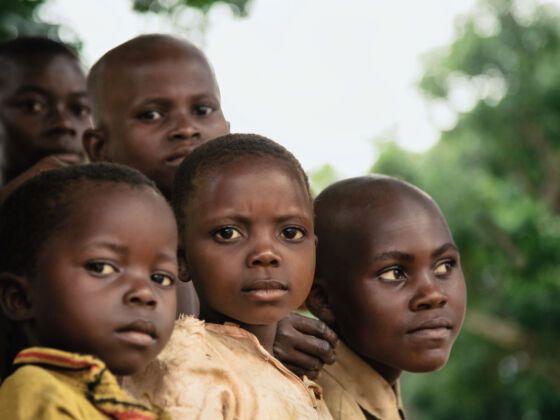LOUISE LINTON DID WHAT MANY OF US DID: She volunteered abroad, then came back and wrote about it. Unlike the rest of us, though, she managed to piss off an entire country. Linton, a Scottish actress and producer, went to Zambia back in 1999 when she was 18-years-old to volunteer at a commercial fishing lodge in Zambia. While there, she claims she was caught up in the Congolese civil war which had spilled over into Zambia, and eventually had to leave. Her book, titled In Congo’s Shadow: One Girl’s Perilous Journey to the Heart of Africa, is being accused of being a wildly inaccurate depiction of Zambia, and of also being one of the worst examples of the “White Savior Complex” in travel writing today.


How a Single Travel Writer Managed to Piss Off an Entire Country
You can read an excerpt she wrote for the book’s release over at the Telegraph. If you don’t want to subject yourself to it, just know that yes, it does indeed contain lines like, “I tried not to think what the rebels would do to the ‘skinny white muzungu with long angel hair’ if they found me,” and “Should I stay and care for Zimba, risking my life? Or flee to the safety of my family and break her heart?”
Zimba, of course, was a 6-year-old HIV-positive orphan, whose “greatest joy was to sit on my lap and drink from a bottle of Coca-Cola.”
Inaccuracies and outcry
There’s been a bit of an outcry among Zambians since the piece was first published in the Telegraph, and the hashtag #LintonLies is now trending. What “lies” are they referring to? Well, Congolese rebels never came over into Zambia, which is actually one of the most peaceful countries in Africa. And the name “Zimba” is a tribal name — from a tribe that her character Zimba did not belong to. On top of this, she mentioned “monsoons” (Zambia doesn’t have monsoons), “12-inch-spiders” (nor do they have those), and she said the rebels were spilling over from the Hutu-Tutsi conflict, which, incidentally, happened in neither Zambia nor Congo, but in Rwanda.
Most offensive, though, is that the piece hits every stereotype about Africa — political unrest, HIV, orphans, poverty, and the idea that the only thing that can fix the problem is a white girl.
Rebels blew up the main water pipe to the village in Northern Zambia . Locals think it’s a waterfall #LintonLies pic.twitter.com/6Nqyqbet5P
— Xhaka Zulu (@MaceWimbu) July 5, 2016
For her part, Linton is surprised at all of the negative feedback: “I am genuinely dismayed and very sorry to see that I have offended people as this was the very opposite of my intent. I wrote this book with the hope of conveying my deep humility, respect and appreciation for the people of Zambia and my sincere hope of making a positive impact there as an 18-year-old volunteer in 1999.”
In truth, Linton’s piece, terrible though it may be, is part of a much larger problem within travel writing.
This isn’t confined to Linton
As a professional travel writer, this story hits a little bit close to home. Not only have I read a hundred different versions of this piece over the past decade, I’ve probably written it myself (though I really hope, when I did, that mine was a bit more self-aware). The main difference is that she managed to get her story published over at The Telegraph, while mine went up on my Facebook page and a now-defunct Blogspot site.
You’ve undoubtedly seen Facebook friends post their “white savior” pictures as well: they are pervasive enough that there’s a “White Savior Barbie” Instagram account dedicated exclusively to parodying them.
A photo posted by Barbie Savior (@barbiesavior) on
What’s most upsetting is that most people who write pieces like this have the best of intentions, and genuinely think they are making the world more “aware” of problems like HIV and extreme poverty. And it’s understandable that people would find this to be a compelling narrative: movies like The Last Samurai, Dances With Wolves and even Avatar have “white savior” themes, and have been relatively popular. So it’s no surprise that kids who travel abroad find themselves drawn to the idea that they are saviors rather than guests.
Travel writers need to do better
As a genre, travel writing is spectacularly guilty of fetishizing other peoples, playing up Messiah narratives, and making other cultures seem worse than they really are. In fact, there’s a very big problem at travel writing’s very core: why would you send me, a white dude from Ohio, to tell you about life in “darkest Africa,” when you could very easily ask an African who has lived there all of their life to tell you about it instead? We have the technology to solicit travel tips from locals literally everywhere on earth. So why is travel writing still so predominantly white?
Mercifully, we live in an age where Linton (who is almost certainly being genuine when she says she meant no ill) can’t write something deeply inaccurate without getting pushback online. But the catastrophe that is her book launch should serve as a reminder to travel writers everywhere: you can’t speak for anyone’s experience but your own. You have to aim for accuracy and avoid hyperbole. You have to be more self-aware. You must understand your own privilege. And, if it’s in your power, help provide a platform to a more diverse set of voices.
Update: The Telegraph has removed the piece. We’ve linked to the reproduced piece on another blog.